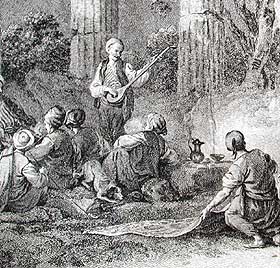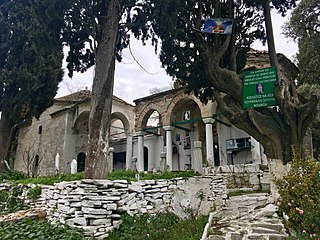
Bektashism is an Islamic Sufi mystic order that originated in 13th-century Anatolia and became widespread in the Ottoman Empire. It is named after the saint Haji Bektash Veli. The Bektashian community is currently led by Baba Mondi, their eighth Bektashi Dedebaba, and is headquartered in Tirana, Albania. Collectively, adherents of Bektashism are called Bektashians or simply Bektashis.

Alevism is a syncretic Islamic tradition, whose adherents follow the mystical Islamic teachings of Haji Bektash Veli, who taught the teachings of the Twelve Imams, whilst incorporating some traditions from Tengrism. Differing from Sunni Islam and Usuli Twelver Shia Islam, Alevis have no binding religious dogmas, and teachings are passed on by a spiritual leader as with Sufi orders. They acknowledge the six articles of faith of Islam, but may differ regarding their interpretation. They have faced significant institutional stigma from the Ottoman and later Turkish state and academia, being described as heterodox to contrast them with the "orthodox" Sunni majority.

Haji Bektash Veli was an Islamic scholar, mystic, saint, sayyid, and philosopher from Khorasan who lived and taught in Anatolia. His original name was Sayyid Muhammad ibn Sayyid Ibrāhim Ātā. He is also referred to as the "Sultan of Hearts" and the "Dervish of the Dervishes".

Rexheb Beqiri, better known by the religious name Baba Rexheb, was an Albanian Islamic scholar and Sufi. He was the founder and the head of the Bektashi Sufi lodge (tekke) located in Taylor, Michigan, United States.

Qizilbash or Kizilbash were a diverse array of mainly Turkoman Shia militant groups that flourished in Azerbaijan, Anatolia, the Armenian highlands, the Caucasus from the late 15th century onwards, and contributed to the foundation of the Safavid dynasty in early modern Iran.

Hacıbektaş is a town and district of Nevşehir Province in the Central Anatolia region of Turkey. It is the seat of Hacıbektaş District. Its population is 5,325 (2022). Located in Cappadocia, its elevation is 1,275 m (4,183 ft). The town is named after Haji Bektash Veli, a 13th-century Sufi saint who founded the Bektashi Order.

The Alian Kızılbaşī community, are a Shi`a order, similar to the Sufi Mevlevi, who live in several regions of Bulgaria. Alians revere the name "Ali" carried by their circle of 12 Imams (awliya'), which they consider an emanation of God. They follow the mystical rituals of the wandering dervishes.

The History of the Shī‘ah Imāmate Alevī Ṭarīqah or The History of the Alevism is that of a community of Muslims of Anatolia and neighbouring regions.

Sarı Saltık was a 13th-century Alevi Turkish dervish, venerated as a saint by the Bektashi Sufi Muslims in the Balkans and parts of Middle East as well as the mainstream Sunni Muslim community.
Otman Baba was a 15th-century dervish who traveled throughout the Ottoman Empire, acquiring a following among Muslims in Bulgaria after 1445 that has developed into his veneration as a saint. After Otman Baba's death, a pilgrimage complex grew around his grave in the present-day Bulgarian village of Teketo, which was made a museum during communism. The hagiography of Otman Baba, written by his disciple Küçük Abdal and regarded by his followers as a canonical text, maintains that Otman Baba performed miracles that proved his superiority to other dervishes and Ottoman authorities, particularly Sultan Mehmed II. Straying from orthodox Islamic tenets, Otman Baba asserted his unity with God and his mastery of divine secrets—as the embodiment of monotheistic religious figures such as Muhammad, Jesus, and Moses.

Balım Sultan was a Turcoman Bektashi sufi who established and codified the Bektashi Order at the beginning of the 16th century. The mystical practices and rituals of the Bektashi were systematized and structured by Balım, after which many of the order's distinct practices and beliefs took shape. He is considered the primary personality in the Bektashi Order after Hacı Bektaş-ı Veli (Haji Bektash) and is regarded as the “Second Pir”.

Turkish folk literature is an oral tradition deeply rooted, in its form, in Anatolian traditions. However, in its themes, Turkish folk literature reflects the problems peculiar to a settling people who have abandoned the nomadic lifestyle. One example of this is the series of folktales surrounding the figure of Keloğlan, a young boy beset with the difficulties of finding a wife, helping his mother to keep the family house intact, and dealing with the problems caused by his neighbors. Another example is the rather mysterious figure of Nasreddin, a trickster figure who often plays jokes, of a sort, on his neighbors.

al-Hajj Dedebaba Reshat Bardhi was Dedebaba of Bektashism from 1991 to 2011.

The Haji Bektash Veli complex is an Alevi Islamic Cultural Monument of the Republic of Turkey, located in Hacıbektaş, Nevşehir province. It was built in the 13th century as a teqe (dergâh) of the Sufi saint Haji Bektash Veli. After his death, his mausoleum was built here.
The Islamization of Albania occurred as a result of the Ottoman conquest of the region beginning in 1385. The Ottomans through their administration and military brought Islam to Albania.

The Durbalı Sultan Tekke, also known as Tekke of Asprogeia or Ireni Tekke, was an Alevi tekke from 1492 located in the village of Ano Asprogeia, now in the Farsala municipality in Thessaly, Greece. It has images of Imam Ali and Haji Bektash Veli in it.

Kurdish Alevism refers to the unique rituals, sacred place practices, mythological discourses and socio-religious organizations among Kurds who adhere to Alevism. Kurdish Alevis consider their hereditary sacred lineages as semi-deific figures, often have beliefs more rooted in nature veneration, and put more emphasis on Pir Sultan Abdal as their religious symbol, unlike Turkish Alevis who emphasize the role of Haji Bektash Veli. Some Kurdish Alevis argue that their beliefs are related to Ahl-e Haqq and Yazidism.

The Bektashi Order is an Islamic Sufi order that spread to Albania through Albanian Janissaries during the period of Ottoman control in Albania. The Bektashi make up 5% of the country's population. In regards to ethics, the Bektashi adhere to the line "Be master of your hands, your tongue, and your loins" which essentially means do not steal, do not lie or speak idly, and do not commit adultery.

The Sovereign State of the Bektashi Order is a proposed European microstate and city-state that would be enclaved entirely within Tirana, the capital of Albania, at the current World Headquarters of the Bektashi. If established, it would be smaller than the Vatican City and become the sovereign state with the smallest land area in the world, with a total land area of 27 acres (11 ha).












